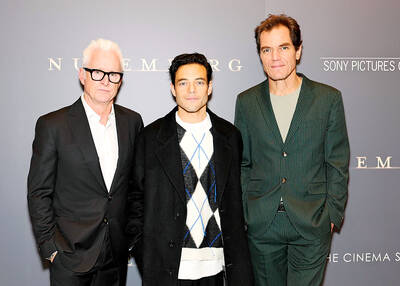The American Cancer Society this week will take its biggest step ever into the politics of health care reform, spending US$15 million in advertising on behalf of Americans with too little health insurance or none at all.
The cancer society - the US' richest health charity, in both donations and volunteers - traditionally focuses its advertising on encouraging Americans to quit smoking or get a screening test.
But this year's campaign will feature television commercials that portray the challenges of uninsured and underinsured cancer patients, accompanied by a call for people to do something about it.
The change comes after cancer society officials concluded that insurance-related problems have emerged as one of the one of the largest obstacles in their goal to cut cancer death rates by 50 percent and incidence rates by 25 percent from 1990 to 2015.
"We're not going to meet our goals if the health care system remains unfixed," said John Seffrin, the cancer society's chief executive.
Starting this week, three commercials on US television network and cable channels will run until late November. Ads will be placed in magazines and on Web sites as well.
The cancer society is not endorsing any particular reform plan or candidate. Even so, it is an unusually pointed campaign for the philanthropy, and for organizations like it.
The American Heart Association's chief executive, M. Cass Wheeler, envied the group's resources and applauded their new campaign.
"Heart and stroke patients are going to benefit from the good this advertising campaign is going to do," Wheeler said. His organization spends US$10 million each year on advertising, and focuses it on exercise and other prevention measures for patients.
The Atlanta-based cancer society, with 2006 revenues of US$1 billion, has been stepping up its political activity in recent years.
In 2001, it formed a sister organization, the American Cancer Society Cancer Action Network, to lobby and work on government health policy. The Cancer Action Network pushed for legislation that would give the US Food and Drug Administration the power to regulate tobacco, and last year fought a bill that would have enabled small businesses to form health insurance pools across state lines without guaranteeing coverage of certain cancer tests.
Now it is putting together petitions and voter's guides, organizing political forums and rallies, and in May will begin a nationwide bus tour promoting health care reform.
Despite the fact that many US cancer patients are 65 and older and are covered by the federal Medicare program, cancer society officials estimate that at least 55,000 of the 1.4 million Americans diagnosed with cancer each year have no health insurance.
Hundreds of thousands of others have coverage but end up financially distressed by uncovered bills, they say.
Inadequate coverage is a major impediment to cancer patients getting the medical care they need. Studies show that women with health insurance get annual mammograms at twice the rate as women who don't, and cancer death rates are higher for people without coverage.
The cancer society joined the heart association, the American Diabetes Association and AARP in leading rallies designed to get the attention of presidential candidates. The rallies were held in Iowa, New Hampshire, Nevada and South Carolina - four early sites of key presidential primaries and caucuses - and all focused on the general issue of providing quality health care for all Americans.
Others groups have efforts, too.
The American Medical Association recently announced a "Voice for the Uninsured" campaign with advertising in early primary states.
Families USA and the Federation of American Hospitals are organizing a series of hour-long presidential forums. The Partnership to Fight Chronic Disease, an 80-organization group formed earlier this year, is placing reform-focused billboards in and around airports and this month used college cheerleaders to voice chronic disease messages outside a presidential candidate debate in New Hampshire.
Some experts predict health reform will be a more potent issue in 2008 than any time since 1992, when it helped carry Bill Clinton to the White House.
Large increases in insurance costs in this decade have caused employers and others to become more interested in systemwide reform, said Ken Thorpe, an Emory University health policy professor.
"Many big businesses have come to the realization they can't solve this problem on their own," he said.
At the cancer society's call center in Austin, Texas, a team of 14 operators have been assigned to take calls from people who are uninsured or underinsured. They form the core of a Health Insurance Assistance Service, which tries to connect people with coverage programs.
It was through the assistance service that the cancer society found the star of one of its new commercials - Raina Bass, 26, a legal assistant in central Missouri.
She survived ovarian cancer in her teens and became a wife and mother. But in 2005, she woke up with a swollen throat one summer morning that turned out to be thyroid cancer.
Both she and her husband had health insurance through their jobs, but it did not cover all her medical bills. Meanwhile, bill collection agencies were calling regularly.
"I should be shouting and jumping that I beat cancer twice," she said in an interview, but instead often found herself crying about debt and job constraints.
Bass was scheduled to appear at a press conference yesterday in Washington for the unveiling of the cancer society campaign.
"I am so glad I've been given the opportunity to finally speak out about this," she said.

The Nuremberg trials have inspired filmmakers before, from Stanley Kramer’s 1961 drama to the 2000 television miniseries with Alec Baldwin and Brian Cox. But for the latest take, Nuremberg, writer-director James Vanderbilt focuses on a lesser-known figure: The US Army psychiatrist Douglas Kelley, who after the war was assigned to supervise and evaluate captured Nazi leaders to ensure they were fit for trial (and also keep them alive). But his is a name that had been largely forgotten: He wasn’t even a character in the miniseries. Kelley, portrayed in the film by Rami Malek, was an ambitious sort who saw in

It’s always a pleasure to see something one has long advocated slowly become reality. The late August visit of a delegation to the Philippines led by Deputy Minister of Agriculture Huang Chao-ching (黃昭欽), Chair of Chinese International Economic Cooperation Association Joseph Lyu (呂桔誠) and US-Taiwan Business Council vice president, Lotta Danielsson, was yet another example of how the two nations are drawing closer together. The security threat from the People’s Republic of China (PRC), along with their complementary economies, is finally fostering growth in ties. Interestingly, officials from both sides often refer to a shared Austronesian heritage when arguing for

Among the Nazis who were prosecuted during the Nuremberg trials in 1945 and 1946 was Hitler’s second-in-command, Hermann Goring. Less widely known, though, is the involvement of the US psychiatrist Douglas Kelley, who spent more than 80 hours interviewing and assessing Goring and 21 other Nazi officials prior to the trials. As described in Jack El-Hai’s 2013 book The Nazi and the Psychiatrist, Kelley was charmed by Goring but also haunted by his own conclusion that the Nazis’ atrocities were not specific to that time and place or to those people: they could in fact happen anywhere. He was ultimately

Nov. 17 to Nov. 23 When Kanori Ino surveyed Taipei’s Indigenous settlements in 1896, he found a culture that was fading. Although there was still a “clear line of distinction” between the Ketagalan people and the neighboring Han settlers that had been arriving over the previous 200 years, the former had largely adopted the customs and language of the latter. “Fortunately, some elders still remember their past customs and language. But if we do not hurry and record them now, future researchers will have nothing left but to weep amid the ruins of Indigenous settlements,” he wrote in the Journal of